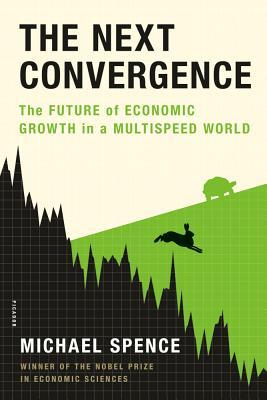A Washington Post Notable Nonfiction Book
Michael Spence, winner of the Nobel Prize in Economic Sciences, clearly and boldly describes what's at stake for all of us as he looks ahead to how the global economy will develop over the next fifty years With the British Industrial Revolution, part of the world's population started to experience extraordinary economic growth--leading to enormous gaps in wealth and living standards between the industrialized West and the rest of the world. This pattern of divergence reversed after World War II, and now we are midway through a century of high and accelerating growth in the developing world and a new convergence with the advanced countries--a trend that is set to reshape the world. Nobel Prize winner Michael Spence explains what happened to cause this dramatic shift in the prospects of the five billion people who live in developing countries. The growth rates are extraordinary, and continuing them presents unprecedented challenges in governance, international coordination, and ecological sustainability. The implications for those living in the advanced countries are great but little understood. Spence clearly and boldly describes what's at stake for all of us as he looks ahead to how the global economy will develop over the next fifty years. The Next Convergence is certain to spark a heated debate how best to move forward in the post-crisis period and reset the balance between national and international economic interests, and short-term fixes and long-term sustainability.
A Washington Post Notable Nonfiction Book
Michael Spence, winner of the Nobel Prize in Economic Sciences, clearly and boldly describes what's at stake for all of us as he looks ahead to how the global economy will develop over the next fifty years With the British Industrial Revolution, part of the world's population started to experience extraordinary economic growth--leading to enormous gaps in wealth and living standards between the industrialized West and the rest of the world. This pattern of divergence reversed after World War II, and now we are midway through a century of high and accelerating growth in the developing world and a new convergence with the advanced countries--a trend that is set to reshape the world. Nobel Prize winner Michael Spence explains what happened to cause this dramatic shift in the prospects of the five billion people who live in developing countries. The growth rates are extraordinary, and continuing them presents unprecedented challenges in governance, international coordination, and ecological sustainability. The implications for those living in the advanced countries are great but little understood. Spence clearly and boldly describes what's at stake for all of us as he looks ahead to how the global economy will develop over the next fifty years. The Next Convergence is certain to spark a heated debate how best to move forward in the post-crisis period and reset the balance between national and international economic interests, and short-term fixes and long-term sustainability.Paperback
$20.00